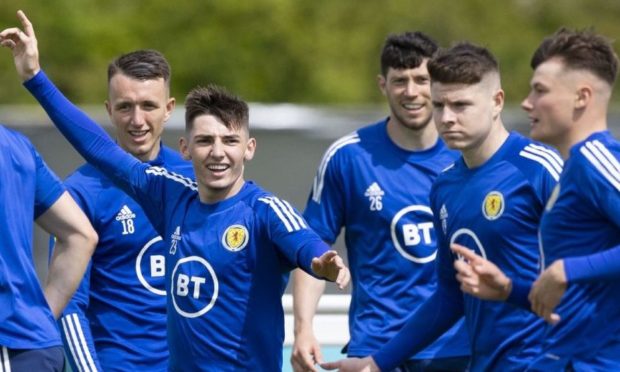Some have been more traumatic than others.
Of the five post-1998 World Cups during which the Tartan Army have been peering through the window, 2006 in Germany felt like the hardest to stomach.
It’s no easy task picking a winner out of the five European Championships but the last one, when we were the only home nation not at France, probably shades it.
When even your Northern Irish friends have the chance to gloat or, even worse, patronise then rock bottom has undoubtedly been reached.
It has been a slog.
A near quarter-of-a-century test of endurance and fidelity.
Let’s not kid ourselves, there have been precious few upsides to suffering Scotland-less tournament football.
There is one, though.
It’s a biggy.
And it has only become apparent over the last few days as the mood of the nation has started to settle.
Defeatism and negativity has been washed away with the passing of time.
🗣 'Greece won it – and no-one expected them to win it.'
Kevin Nisbet makes 'anything can happen' admission as he says Scotland's main priority is group stage progression.
– With @ArnoldClark pic.twitter.com/AhEo9I6j7J
— PLZ Soccer (@PLZSoccer) June 10, 2021
There has been an unshackling from the meek acceptance that misery is part of the qualification deal and that being one of the first to leave the party is as good as it will get.
Those of us nearer to 50 than 40, bearing scars of living through eight missed opportunities to get to the knock-out stage of a World Cup or European Championship, are being out-numbered and drowned out by the generations behind us who blessedly only see open horizons and opportunities rather than the prospect of inevitable failure.
There is no better way of summing up the unbridled and atypical optimism currently seeping into a football-loving country than putting the last official pre-championship song up against the latest unofficial one.
We have journeyed from ‘Don’t Come Home Too Soon’ to ‘Yes Sir, I Can Boogie’.
That’s your transformation.
Children who don’t know any better are saying ‘we can win it’ and adults who should know better (yes, that’s you, Craig Brown) are too.
Even if you’re not kicking reality out of the ground with that sort of ridiculous fantasy, it’s a fact that more teams will get out of their group than won’t and that winning one game and making sure you don’t get hammered in the other two might even be all that’s required.
It’s a low bar.
And it’s a fact that this Scotland team can reasonably expect to beat the Czech Republic and draw with Croatia on their own pitch to all but ensure that last-16 progression.
There are clear areas of weakness in Steve Clarke’s team.
Both David Marshall and Craig Gordon are past their best and even when they were at their peak, had significant goalkeeping flaws.
It doesn’t take a Jurgen Klopp or a Pep Guardiola to come up with a game plan that involves getting at our right-back, who, for the first game at least, is likely to be the no better than average Scottish Premiership player that is Stephen O’Donnell.
And it wouldn’t be a shock if we are exposed across two-thirds of the centre-back unit as well.
That’s a big chunk of the pitch to chip away at if you’re a midfield and attack that has the patience and ball-retention skills to probe and then strike when opportunity presents itself (that’ll be all three group opponents).
The ‘what ifs’ teasing the Tartan Army
But there are some tantalising ‘what ifs’ about this Scotland squad, whose ceiling is yet to be determined and tested.
What if Nathan Patterson gets an opportunity in the group games and shows that he is further down the developmental track than we thought and the right side becomes a mid-tournament point of strength rather than frailty?
What if the left side defensive combination of Kieran Tierney and Andy Robertson continues to thrive and improves to a game-defining level?
What if Che Adams blossoms into the elite striker Scotland has been crying out for and his early appearances in dark blue have teased us that he might just be?
What if Clarke is brave enough to select Billy Gilmour and he shows the world why it is no exaggeration to categorise him as a young Modric or Iniesta?
What if John McGinn continues to be the sort of talismanic figure championship finals are made for?
What if the Scots can find a St Johnstone-esque mindset and rhythm and a coach who places great emphasis on ingrained training ground habits gets a side functioning beyond their perceived place among their competitors?
Get one of the above in isolation and this is a Scotland team to be respected at Euro 2020. Get two or three and it is the equal of Wales, who reached the semi-finals five years ago.
If you’re one of those dreamers who has pinned your wallchart up and dared to plot a route through the tournament, you’ll know that whichever way the Scots can get out of Group D would mean facing one of the favourites in the next round or the quarter-finals.
That’s the big picture.
But it’s for another day.
Mr Brown’s Boys did indeed come home too soon, the same as all the other Scottish World Cup and European Championship teams before them.
But don’t let that inhibit your enjoyment of the boogie with Mr Clarke’s Kids.
There’s a good chance they’ll have to be dragged off the dance floor.
How many points will Scotland need to qualify from their Euro 2020 group?
